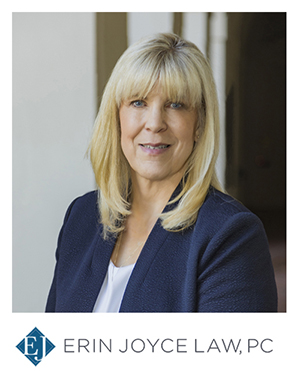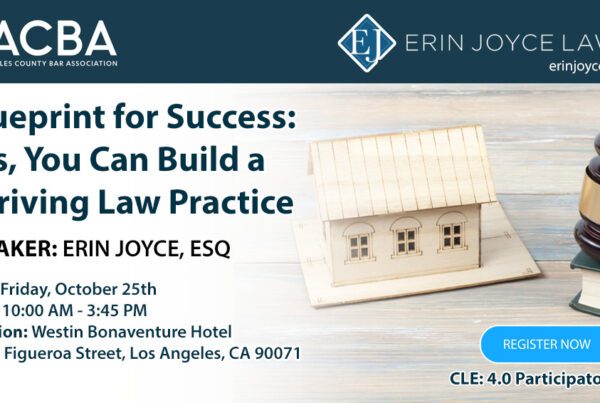Don’t Be Tempted by the Fruit of the Alternative Payment App Tree
By Erin Joyce
“Everything you want in life has a price connected to it. There’s a price to pay if you want to make things better, a price to pay just for leaving things as they are, a price for everything.” – Harry Browne
Have your tech-savvy clients demanded that if you don’t let them send you their retainers through a smartphone app that they consider you a dinosaur and may take their work elsewhere? Have you been tempted to accept an alternate form of payment so that your retainer will instantly be in your possession? Are you tempted to make the client pay for the processing fees, if any, charged by one of the new smartphone payment processing app?
As technology to accept alternate forms of payment explodes, lawyers are asking if they can accept alternatives to the traditional check in the mail. With regard to services fully earned and costs already expended, the answer is clearly yes. However, when it comes to accepting money for future services, unearned flat rate fees or unearned costs, the answer is nearly always no.
The California Rules of Professional Conduct are some of the strictest in the nation when it comes to trust accounting. As such, lawyers must use extreme caution with client funds and banking. Even though the language of Rule of Professional Conduct 1.15 suggests that an attorney may keep some funds in a trust account to cover bank charges, this language is not a catch-all exception and should not be relied upon as a basis to accept PayPal or Venmo payments for advanced attorney fees or costs..
The 2018 commentary makes the application of Rule 1.15 very understandable, if harsh: Client funds shall not go into a business account under California law. Less than scrupulously perfect accounting of fees for unearned costs and fees in an IOLTA account may subject an attorney to discipline, lead to accusations of commingling and worse. Until alternative payment plans like Venmo can certify that they split out the advance fee payment component into the trust fund and all merchant charges to the operating account, California attorneys must beware.
In order to ensure that you are in full compliance with California’s complex trust fund accounting rules, learning the do’s and don’ts of alternative payment systems is crucial to your practice.
- The current California rules covering alternative payments
The most important rules governing attorney payments relate to safekeeping (formerly referred to as “preserving”) of client funds and attorney-client privilege. Rule 1.15(a) states as follows:
All funds received or held by a lawyer or law firm for the benefit of a client … including advances for fees, costs and expenses, shall be deposited in one or more identifiable bank accounts labeled “Trust Accounts”.
The other impacted rules include confidentiality/attorney-client privilege, the duty to communicate and unconscionability of fees.
This rule sounds simple enough, but the history of the application of this rule to credit cards has had a long and tortured history.
- What is a P2P app?
Before turning to that history, a brief explanation of the latest alternative payment structure, called in technical terms a “peer to peer” or P2P payments is worth consideration. P2P apps entice the consumer with seamless and free payments. PayPal, founded in 1998, offered one of the earliest internet payment services, hitting it big when purchased by eBay in 2002. Online commerce needed a way for customers to hide their bank account information from strangers selling goods. PayPal’s anonymous middle-man solution hit it big.
Following PayPal’s success, the race was on for services that were even better, transferring the payments to smart phone apps, linking to debit cards and offering services for free. Literally dozens of e-commerce payment methods are available including ApplePay, GooglePay, Zelle, Square and even now Facebook Pay. While these racy new payment systems may look like new technology, many are merely a new interface with the same old credit-card back end.
For example, Venmo is fast becoming the leading app for transfers of funds under $10,000.00. It is free for many basic services and has no monthly fees for users. However, if a user requires a truly instant payment, then there is a fee. Otherwise, the transfer of funds may take days behind the scenes, just as with a regular credit card. In essence, many P2P applications are basically the same old merchant bank transactions with a new smoother interface.
Just as with credit cards, many of these systems are non-recourse – when a payee has insufficient funds, a charge back may occur many days later if the payee’s bank account does not have enough money. In essence, they are merely “virtual ledgers” that represent funds trading hands. Until the P2P transfers the balance into the recipients’ bank, the money is not in the their possession. So just as with plain vanilla credit card fraud, both attorneys and their clients themselves may easily fall victim to scammers.
- Credit Cards and payment for Legal Services – a brief but long history
So, if many P2P payments are simply dressed-up credit cards, why is there a problem? Haven’t credit card payments to lawyers been allowed for decades? The answer is, as lawyers say, yes and no.
The modern credit cards as we know it began in the 1940s when post-War banks adopted the “charge card” as a popular incentive. In the late 1960s, the Visa and Mastercard systems created vast interlinked systems crossing between vendors and banks, allowing a plethora of fees to be charged to merchants who were allowed to use the services, and interest on payments from the customer to the credit card middle-man.
Despite their popularity, paying for legal services with such cards was generally frowned upon. A major reason was simply that it was “unseemly” to equate the legal system with merchant services. How could the dignity of saving a person from death row be equated with buying a hat? As a result, some state staunchly forbid their use for decades. Some reasons bordered on frivolous: would the display of the “Visa/Mastercard” accepted here stickers would be improper solicitation. Others were serious – again issues of attorney client privilege, the possibility of fraud and the risk of charge-backs against an operating account were already identified problems.
Approval of the use of credit cards in California was astonishingly not formally considered by the State Bar until as late as 2007. In Opinion No. 2007-172, the State Bar finally directly considered the ethics of credit card payments for (1) earned fees, (2) fees not yet earned, and (3) advances for costs and expenses, past and present.
Opinion 2007-172 readily found that payment of earned fees was allowed. However, certain ethical obligations still had to be met, importantly written informed consent that confidentiality would be impacted.
The issue of whether credit card payments were allowed for fees not yet earned (i.e. retainers) was more complex. Under the State Bar’s 2007 opinion and the old Rule of Professional Conduct 4-100, an attorney was “ethically permitted, but not required to, deposit fees not yet earned into a trust account.” The rationale was that commingling trust funds with business funds was fraught with risk for the consumer. Once funds from the servicer were provided into the attorney’s merchant account, then those funds would be subject to invasion. This was and is true even if the client funds remain in the account for a fraction of a second. Once deposited, the merchant bank may be able to invade the funds for situations such as charge-backs. The attorney would be required to delay transfer those fees until a charge back waiting period expired – during this period, the entrusted funds (and the other client money in the trust account) would be subject to invasion.
Yet despite acknowledging these serious concerns, COPRAC Opinion 2007-172 ultimately found that fees not yet earned could be paid for by credit card and placed into a merchant account. Concerns about confidentiality could be dealt with in a written retainer agreement, and the attorney was reminded of the need to refund advanced fees not earned. But otherwise, credit card payments were arguably allowed to briefly pass through the merchant account.
Finally, Opinion 2007-172 found that since funds received for future costs and expenses through a credit card were indeed “funds received or held for the benefit of clients” they could not be accepted through a merchant account that was subject to invasion.
- The Stricter Rules – no mixing IOLTA funds with operating funds ever
On November 1, 2018, new Rule 1.15 regarding safekeeping client funds was adopted by the California Supreme Court. The rule on its face appears the same in language and purpose as the former rule – client funds shall be placed into a trust account where they will be preserved and segregated from other funds. The Rule also allows for some funds to be kept in the trust account “reasonably sufficient to pay bank charges” as did the earlier rule.
The application of the law as indicated in the “Executive Summary” attached to the New rule discusses an entirely different picture. The primary controversy in revising Rule 1.15 was the revision of the way in which flat fees are to be kept in trust accounts as “unearned fees.” In its discussion of this change in the law, the Executive Summary concluded that the new rule “generally required that advanced fees be held in trust.”
Rule 1.15 requires that attorneys keep their trust accounts inviolate, since that is crucial to keeping the trust account safe again from invasion by other entities such as merchant banks seeking charge-backs or taxing authorities seeking to ignore the trust account formalities.
The 105-page “Handbook on Client Trust Accounting for California Attorneys highlights the need to maintain all entrusted funds in a recognized, denominated trust account.” Unlike the plain language of the Rule which seems to allow for some inclusion of funds reasonably needed to cover bank fees such as charge-backs, the Handbook stresses:
“You can’t keep any money belonging to you or your law firm (other than money for bank charges) in any of your client trust bank accounts. This is also known as commingling.”
Since taking monies through one of the new payment apps (or even a traditional credit card) for advanced fees may place client monies in an attorney’s client trust account at risk, it is improper to use such methods to collect advanced fees. There are several compliant credit cards which will only take transaction fees from an attorney’s operating account, and will not invade trust accounts for charge-backs, the most widely used is LawPay. An attorney cannot safely attach any other type of merchant account (or payment app) to a client trust account.
Using peer to peer apps for client payments is fraught with peril in California. As attorneys are now obligated ethically to understand the technology that they are using and its impacts on their practice, it is imperative that you understand the payment system you agree to accept for fees and costs. Trust accounts more than ever are under scrutiny by the State Bar, merchant banks seeking ostensibly to prevent fraud and governmental tax agencies. Don’t get caught in the middle – stick to the basics until you are convinced that the new, easier technology is also ethical.
California Rules of Professional Conduct, Rule 1.15 (adopted November 1, 2018) (former Rule 4-100)
Rule 1.6 (former 3-100); see also Business and professions Code section 6068(e).
Rule 1.4 (former 3-500) (duty to communicate)
Rule 1.5 (former 4-200) (fees for legal services)
Lawyers are now expected to stay on top of technology changes (Rule 1.1, Comment [1], effective March 22, 2021), so as the cliché goes, “ignorance will be no excuse.”
Even worse, Venmo offers no buyer or seller protection, unlike credit cards which are governed by numerous consumer fraud laws.
American Bar Association Informal Ethics Opinion 1120 (1969) (repealed in 1983)
New York State Bar Association, Ethics Opinion 362, October 25, 1974 (North Carolina, Texas and Michigan).
Id.
Id. (referring to North Carolina and Texas). One solution by some bar associations was to create “Professional Participation Agreements” – local bar associations were allowed to group together and in essence create locally regulated payment plans. Those plans would have specific rules including being delineated in fee agreements and also arbitration. See San Diego County Bar Association Legal Ethics Committee, 1983-1 (state bar plans may allow attorneys to charge interest on payments
Opinion.2007-172.
Id., (citing Business and Professions Code Section 6068(e); former Rule of Professional Conduct 3-100, current Rule 1.6). Opinion 2007-172 noted that it was not an unconscionable fee merely to accept payment via credit card, nor did the attorney payment for the merchant’s charges violate the rules of sharing fees with non-attorneys. “A service-charge debit, which amounts to the attorney’s payment for a convenient method of receiving funds owed the attorney…” did not harm the “integrity of the attorney-client relationship.”
The definition of what is an “advance,” “unearned fees” or “true retainer” is the subject of lengthy history on its own and is beyond the scope of this article.
Id., at page 5.
Id., at page 5; note that this again was in contrast to the receipt of funds for payment of already expended costs, which were perfectly fine to have been paid by credit card.
Rule 1.15, Executive Summary, page 3.
http://www.calbar.ca.gov/Portals/0/documents/ethics/Publications/Portals0documentsethicsPublicationsCTA-Handbook.pdf – The extremely serious tenor of the State Bar’s handbook is shown by the opening words “If you died suddenly…”
“Handbook on Client Trust Accounting for California Attorneys,” page 3.
Erin Joyce is founder of Erin Joyce Law in Pasadena.

Erin is a former 18 year State Bar prosecutor now focusing on ethics consultations for small and mid-sized firms and State Bar defense.
Erin Joyce Esq.
117 East Colorado Blvd., Suite 465 Pasadena, California 91105
Call: 626.314.9050
Email: [email protected]
LAW IN THE NEWS

Building Your Own Thriving Law Practice

Ethics in the Digital Age

7 Key Concepts Of Trust Accounting
CONTACT ERIN JOYCE LAW
REPRESENTING CLIENTS THROUGHOUT ALL OF CALIFORNIA
When you get a letter from the State Bar, don’t go it alone! You need competent, experienced counsel to respond to the State Bar at every stage. Your license is at risk, so ensure you have the best representation from a former State Bar prosecutor before sending any response to an investigator or responding to formal charges leveled by the State Bar. You cannot make an informed decision without good advice. Call Erin now.











